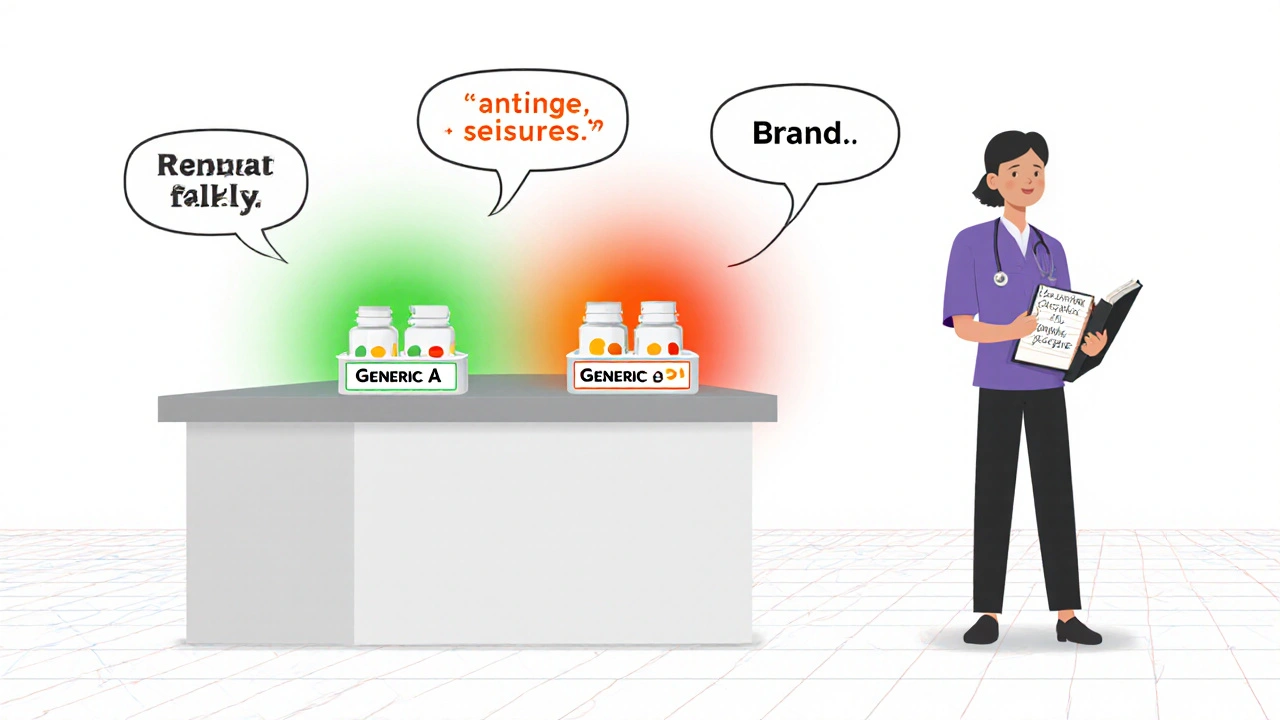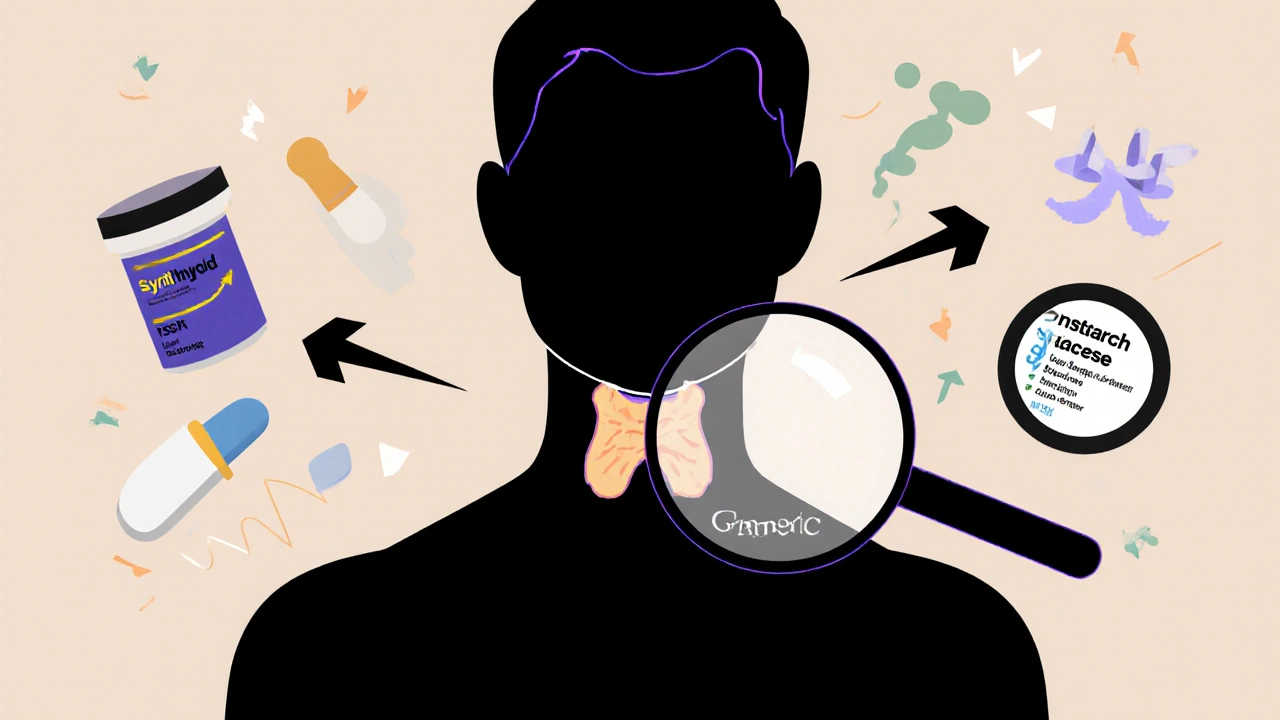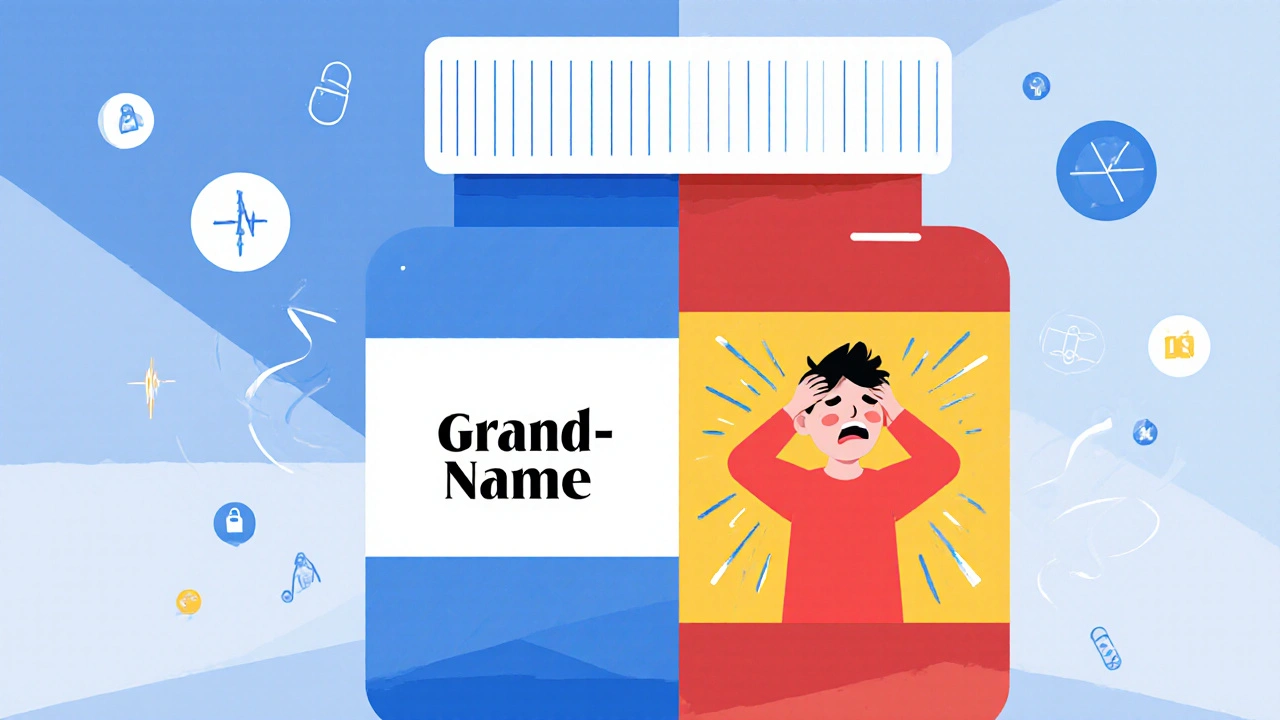For most people, switching from a brand-name drug to a generic version is seamless. The pill looks different, the price is lower, and the effect feels the same. But for a significant number of patients, that switch triggers unexpected side effects-fatigue, anxiety, mood swings, or even seizures. Why does this happen? The answer isn’t about quality control or fraud. It’s about biology, chemistry, and the limits of regulatory standards.
Generics Are Supposed to Be the Same-But They’re Not Identical
The FDA requires generic drugs to contain the same active ingredient, strength, and dosage form as the brand-name version. That’s the law. But here’s what the label doesn’t tell you: generics can have completely different fillers, dyes, coatings, and preservatives. These are called inactive ingredients, and they make up 80% to 99% of the pill’s weight. While they don’t treat your condition, they can change how your body absorbs the medicine. For example, one generic version of levothyroxine might use cornstarch and lactose as binders, while another uses cellulose and titanium dioxide. One might have a film coating that dissolves slowly in the stomach; another might break down faster. These tiny differences matter-especially for drugs with a narrow therapeutic index.What Is a Narrow Therapeutic Index?
Some medications work in a very tight window. Too little, and they don’t work. Too much, and they become toxic. These are called narrow therapeutic index (NTI) drugs. Common examples include:- Levothyroxine (for hypothyroidism)
- Warfarin (a blood thinner)
- Phenytoin and carbamazepine (for seizures)
- Digoxin (for heart rhythm)
Real Patients, Real Problems
A 2019 study in JAMA Internal Medicine followed over 2,000 people who switched from brand-name Synthroid to generic levothyroxine. Nearly 24% had thyroid hormone levels swing out of the safe range within six months. That’s more than double the rate of people who stayed on the brand. Patients reported fatigue, weight gain, brain fog, and depression-classic signs of under-treated hypothyroidism. On Reddit’s r/pharmacy forum, users consistently report problems with generic bupropion (the generic for Wellbutrin). One user wrote: "Switched to generic and got migraines so bad I couldn’t work. Went back to brand-gone in two days." Another said: "I had panic attacks I’d never had before. My pharmacist said it was all in my head. It wasn’t." A 2023 survey by ThyroidChange, a patient advocacy group, found that 73% of thyroid patients felt worse after switching to generic levothyroxine. Over half needed their dose readjusted just to get back to how they felt before.
Why Pharmacists Can’t Always Prevent This
Pharmacists are trained to substitute generics automatically unless the doctor says "dispense as written." But most don’t know the exact formulation of every generic version on the shelf. Even if they did, manufacturers change suppliers and formulas without notifying pharmacies. A 2022 survey of over 3,200 community pharmacists found that 68% had seen patients have adverse reactions after switching between different generic brands of the same drug. Over 40% said this happened frequently-more than five cases a month. Some chains like CVS and Walgreens now block automatic substitution for NTI drugs unless the prescriber approves it. That’s a good step. But it’s not universal. And patients rarely know to ask.What the FDA Says vs. What Patients Experience
The FDA insists that 99.7% of generic drugs meet bioequivalence standards. That’s true. But standards are averages. They don’t account for individual sensitivity. One patient might tolerate a 120% absorption rate just fine. Another might have a seizure at 115%. FDA Commissioner Robert Califf said in 2023 that only 0.3% of generics need extra review. But that’s about manufacturing consistency-not patient response. The agency doesn’t track how many people get sick after switching. They track whether the drug meets a lab test. That’s not the same thing. Meanwhile, patient-reported data tells a different story. On Drugs.com, 38% of users taking generic levothyroxine said their symptoms got worse. That’s not anecdotal-it’s a pattern.When Generics Work Just Fine
Not all drugs are created equal. For medications with a wide therapeutic index-like metformin for diabetes or atorvastatin for cholesterol-the differences between generics don’t matter much. A 2020 review of 15 studies with over 3,400 patients found no meaningful difference in blood sugar or cholesterol control between brand and generic versions. For these drugs, switching is safe. The body has room to adjust. But for NTI drugs, there’s no margin for error.
What You Can Do
If you’re on a high-risk medication, here’s what to do:- Ask your doctor if your drug is a narrow therapeutic index medication. If yes, request "dispense as written" on the prescription.
- Check the pill. If the shape, color, or imprint changes, it’s a different generic. Track your symptoms.
- Request the inactive ingredient list from your pharmacist. The FDA has a public database. Look up your drug and see what’s in it.
- Get blood tests. If you’re on levothyroxine, warfarin, or phenytoin, ask for a lab test 4 to 6 weeks after any switch. Don’t wait for symptoms.
- Keep a journal. Note energy levels, mood, sleep, and side effects. Bring it to every appointment.
The Bigger Picture
The U.S. saves $373 billion a year using generics. That’s huge. But saving money shouldn’t mean risking health. The FDA is starting to respond. In 2024, they proposed stricter standards for 23 high-risk drug classes. They’ve also approved the first "authorized generic" of Synthroid-same formula as the brand, sold under a generic label. Research is also emerging in pharmacogenomics. Scientists can now test your genes to predict how you’ll respond to certain drugs. One 2024 study showed this method predicted generic response accuracy at 84%. That’s not widely available yet-but it’s coming. The goal isn’t to eliminate generics. It’s to make them smarter. For most people, they’re perfect. For a small but significant group, they’re dangerous. The system needs to recognize that difference.What’s Next?
The European Union already has tighter bioequivalence rules for NTI drugs-90% to 111% instead of 80% to 125%. That means fewer generic options, but fewer adverse events. The U.S. may follow. For now, the burden falls on patients. If you’ve ever felt "off" after a generic switch-don’t ignore it. Don’t assume it’s in your head. Your body is telling you something. And it’s not just you.Are generic medications safe?
Yes-for most people and most medications. Generics are safe and effective for drugs like metformin, statins, and antibiotics. But for narrow therapeutic index drugs like levothyroxine, warfarin, or phenytoin, switching between generic versions can cause dangerous fluctuations in blood levels. Safety depends on the drug, not just the label.
Why do some people feel worse on generic levothyroxine?
Levothyroxine has a very narrow therapeutic window. Even small changes in how the body absorbs it-due to different fillers, coatings, or dissolution rates-can cause thyroid hormone levels to swing out of the safe range. Studies show nearly 25% of patients experience abnormal TSH levels after switching to a generic version, leading to fatigue, weight gain, and depression.
Can I ask my pharmacist not to substitute my generic?
Yes. You can ask your doctor to write "dispense as written" or "no substitution" on your prescription. You can also ask your pharmacist for the specific generic manufacturer you’ve been using. Many pharmacies now honor these requests for high-risk medications like thyroid drugs or seizure medications.
Do generic medications have the same side effects as brand-name drugs?
The active ingredient causes the same therapeutic effects and most side effects. But differences in inactive ingredients can cause new or worsened reactions-especially in people allergic to dyes, lactose, or preservatives like bisulfites. Some patients report headaches, anxiety, or GI upset after switching, even when the active drug is identical.
Should I avoid generic medications altogether?
No. Generics are safe, effective, and save billions in healthcare costs. But for medications with a narrow therapeutic index-like thyroid hormones, blood thinners, or seizure drugs-stick with the same formulation. If you’re doing well on a brand, don’t switch unless your doctor advises it. If you’re on a generic and feel off, talk to your provider before assuming it’s "all in your head."


Post A Comment